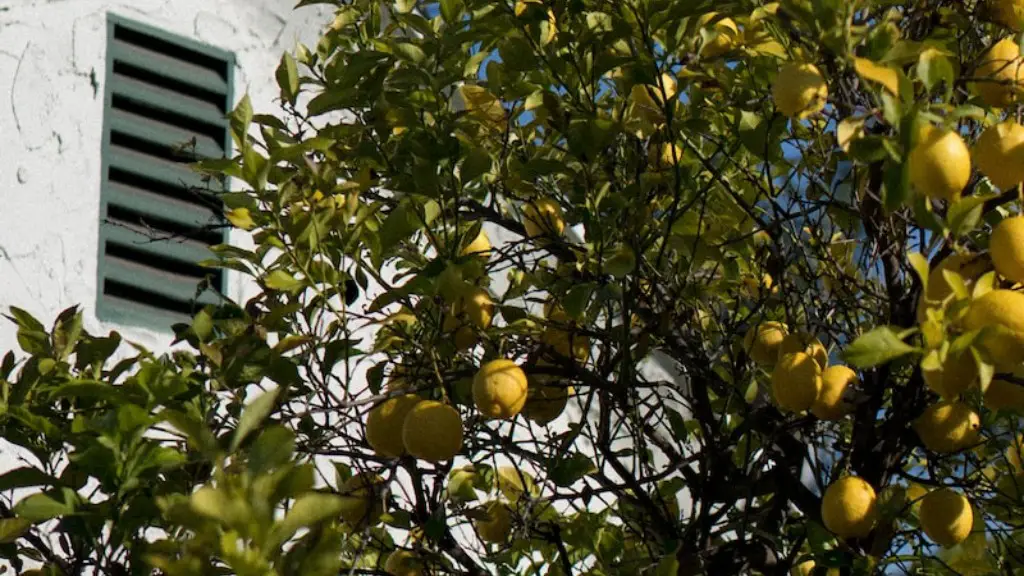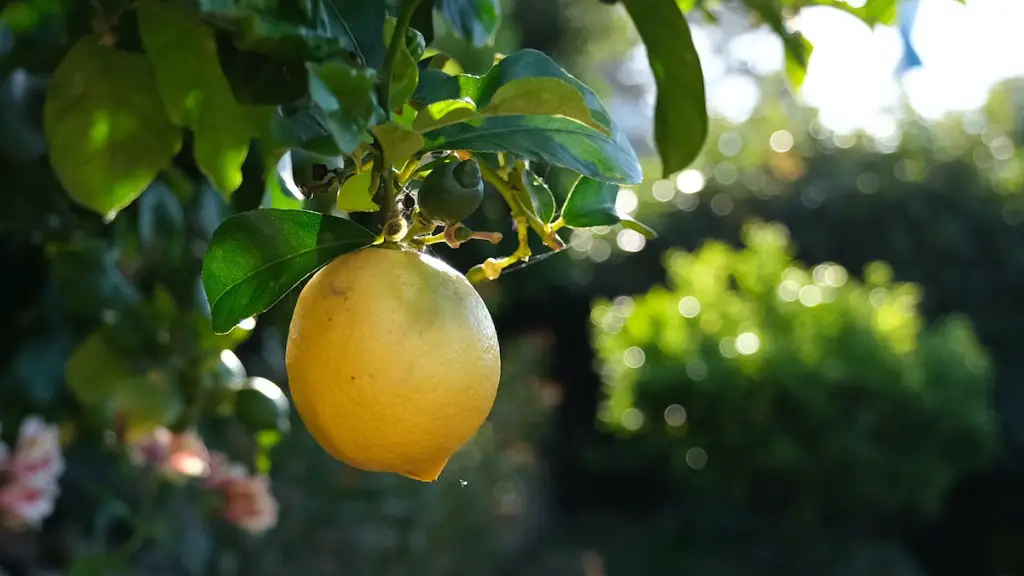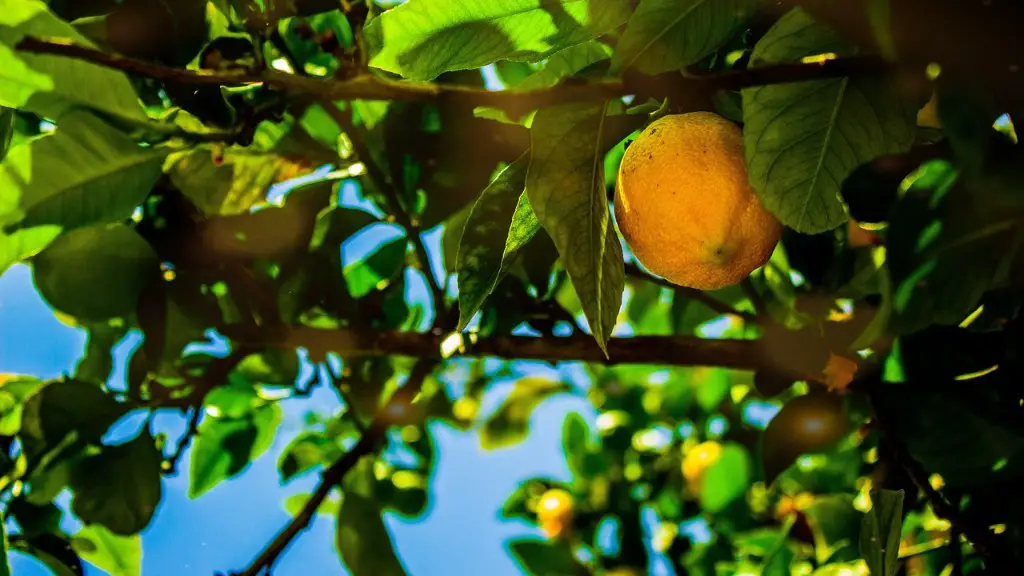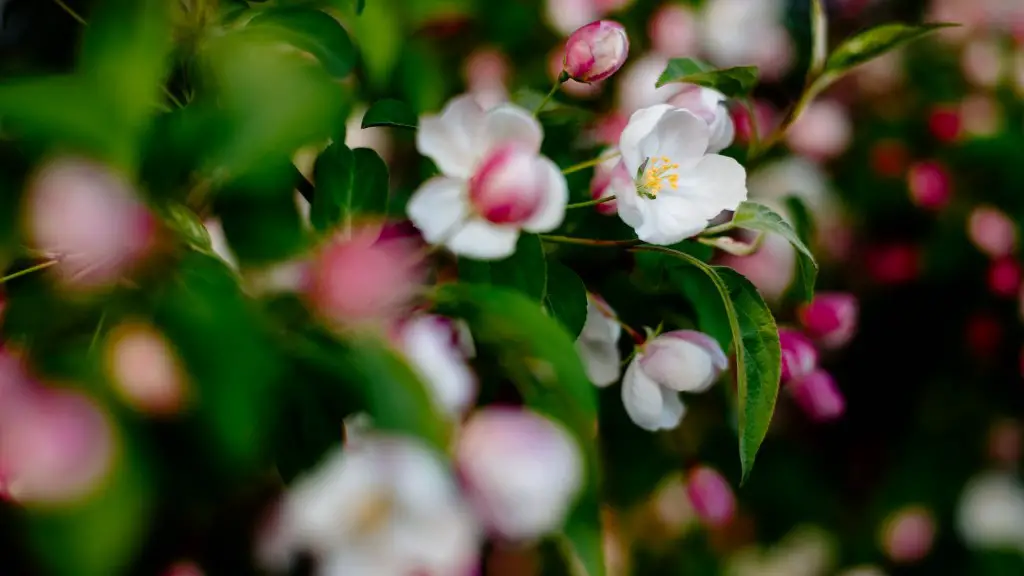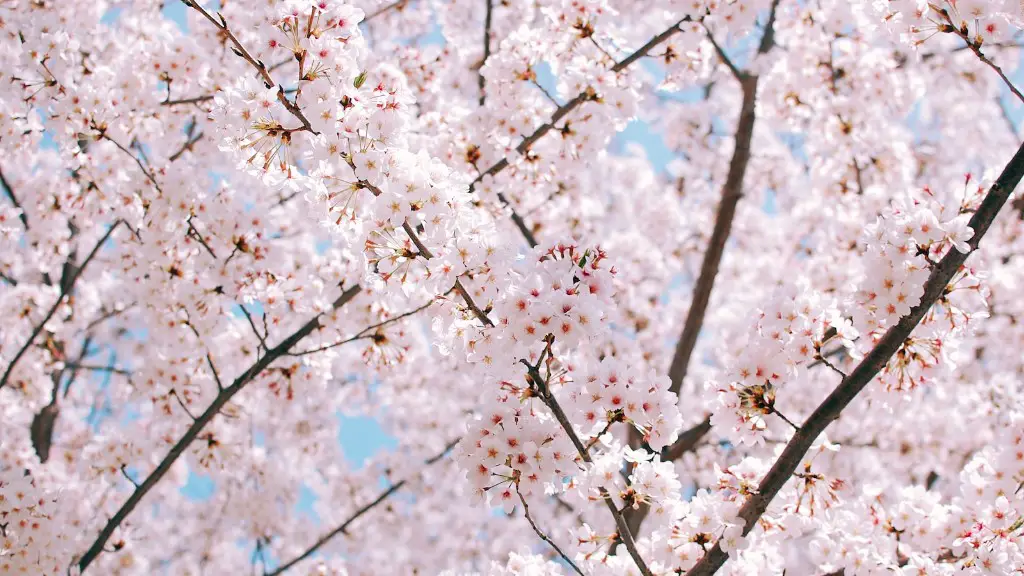Meyer lemon trees are an excellent addition to gardens of all sizes. When planted correctly and provided with adequate care and attention, these trees can provide beautiful, bountiful harvests for many years. One of the keys to growing a healthy, thriving Meyer lemon tree is fertilizing it correctly. It is important to understand when and how to apply the right fertilizer for best results.
First and foremost, it is best to fertilize the Meyer lemon tree only when it is actively growing. Depending on where the tree is located, this could be several times per year, such as during the early spring, mid-summer, and late fall. If the tree is in an area with a mild climate, such as a coastal area, then it may be possible to fertilize it throughout the entire year, though it should be done so sparingly.
When fertilizing the Meyer lemon tree, organic fertilizer is usually preferable. Natural fertilizers, like compost or manure, help to supplement the soil and create healthy, active soil that will benefit the Meyer lemon tree throughout the growing season. Chemical fertilizers should be avoided, or used sparingly, as they can disrupt delicate soil biology and cause it to become unbalanced.
Organic fertilizers should be applied lightly and evenly around the base of the Meyer lemon tree, starting about 6 inches away from the trunk and extending all the way to the edges of the tree’s canopy. The exact amount of fertilizer to be used will depend on the size of the tree, but should typically be no more than 1 pound per every 1,000 square-feet of ground area. It is also important to note that the fertilizer should be worked into the top several inches of soil in order to aid in absorption and promote optimal growth.
Finally, it is vital to water the Meyer lemon tree thoroughly after each fertilizer application. Doing so will help the tree to absorb the nutrients quickly, as well as prevent the fertilizer from burning the roots of the tree. The amount of water needed will vary based on the type of fertilizer used and the amount of soil it will need to penetrate and should be determined prior to application.
Fertilizer Types
When considering the type of fertilizer to use on a Meyer lemon tree, it is important to choose the right type for the climate and soil conditions. For example, in sandy soils, fertilizers with a higher percentage of nitrogen can be beneficial for quick absorption, but in clay soils, slower-acting fertilizers containing a higher percentage of phosphorus can be better absorbed.
In addition to the type of fertilizer, it is important to also consider the amount of nitrogen, phosphorus and potassium that it contains. Generally speaking, a fertilizer with an N-P-K ratio of 4-3-3 or 6-3-3 is ideal for Meyer lemon trees, as this will provide them with a well-balanced mix of essential macro and micronutrients. For trees that have not produced fruit in the past, a fertilizer with a higher nitrogen content, such as an 8-4-4 ratio, can be beneficial for promoting healthy fruit production.
It is also important to remember that fertilizers come in many forms, not just liquids and powders. For example, there are also granular fertilizers that can be easily applied with a spreader, or slow-release pellets that can be placed around the roots and watered in to release nutrients over a period of time.
In any case, it is important to read the instructions provided on the fertilizer packaging and to always follow the recommendations for the type and amount of fertilizer to be used. Doing so will help ensure that the Meyer lemon tree is getting the nutrients it needs to grow strong and healthy.
Best Practices
When fertilizing a Meyer lemon tree, it is essential to remember some important facts. First and foremost, fertilizer should never be applied directly to the leaves or the trunk of the tree as this can cause serious damage or even kill the tree. Fertilizer should also not be applied during the middle of the summer or during periods of extreme heat and drought, as too much nitrogen can be harmful to the health of the tree.
It is also important to use only the amount of fertilizer recommended by the manufacturer as too much can cause excessive growth, resulting in weak branches and foliage. Additionally, it is beneficial to consider the age and health of the Meyer lemon tree before applying any fertilizer as young trees that are still in the process of establishing their root systems should typically receive no more than half the recommended amount.
Finally, it is essential to periodically check the pH level of the soil around the Meyer lemon tree. This can be easily achieved with a soil pH test kit and will help to ensure that the pH levels of the soil remain within a healthy range for the tree. Overly acidic or alkaline soils can prevent the Meyer lemon tree from properly absorbing the nutrients present in the fertilizer, so having the proper pH levels is essential for optimal growth.
Pruning & Watering
In addition to fertilizing, pruning and watering the Meyer lemon tree are equally important for its health and growth. Pruning should be done carefully, with sharp tools and tools specifically designed for trimming trees, and with caution taken to avoid damaging the branches. Pruning aggressively will help to keep branches strong and help to ensure that fewer limbs are shading the fruit, allowing it to receive maximum sunlight.
When watering the Meyer lemon tree, it is important to provide it with a deep, thorough soaking. This means that the tree needs to be watered slowly, letting the water seep into the soil instead of simply running off. Doing so helps to ensure that the tree’s roots are getting the moisture they need, while also encouraging good drainage and helping to prevent over-watering.
Finally, it is important to remember that fertilizing, pruning and watering the Meyer lemon tree should be done together for the best results. By following a regular schedule of fertilizing, pruning and watering, and by selecting the right type of fertilizer for the climate and soil, a Meyer lemon tree is sure to thrive and provide agriculturists with an abundance of sweet, juicy fruit for many years.
Fertilizer Timing
The timing of fertilizer applications for Meyer lemon trees is an important factor when it comes to ensuring successful growth. For best results, fertilizer should be applied every six months or so, as long as the tree is actively growing. If, however, the tree is in a location where the climate is milder and frost-free, then fertilizer can be applied more frequently.
It is important, however, to always follow the instructions on the fertilizer packaging, as some fertilizers may need to be applied at longer intervals, such as once a year. In any case, it is always best to apply the fertilizer when the tree is actively growing, and avoid doing so during periods of extreme heat or drought.
The amount of fertilizer that should be applied also depends on the age and health of the Meyer lemon tree. For example, younger trees may need less fertilizer than mature trees, as the former will not require additional nutrients to the same extent as the latter. Additionally, overly fertilized trees may require less fertilizer, as too much fertilizer can result in leaf and root damage and root burn.
Fertilizing the Meyer lemon tree, when done correctly and at the right time, is essential for providing it with the nutrients it needs for healthy growth and abundant fruit. By following the guidelines outlined in this article and by taking into consideration the climate and soil of the tree’s location, arborists can ensure that their Meyer lemon trees will thrive and produce a plentiful yield.
Soil Enrichment
In addition to the application of fertilizer, it is important to ensure that the soil surrounding the Meyer lemon tree is enriched and healthy. For example, incorporating compost or leaf mold into the soil can provide essential nutrients and help to improve drainage as well. Doing so can also help to prevent fertilizers from leaching away and becoming concentrated, which can lead to unhealthy levels of some elements.
Adding a layer of mulch around the tree can also be beneficial for the health of the Meyer lemon tree. Doing so can help to retain moisture in the soil, as well as prevent weed growth and reduce the amount of fertilizer that may leach away. Additionally, mulching the tree can help to lower the surface temperature of the soil, keeping its roots cool and protected.
Finally, it is important to remember that Meyer lemon trees enjoy an acidic soil and require an environment with a neutral to slightly acidic pH level. As such, it is important to periodically check the soil’s pH level with a pH test kit and to make use of soil amendments such as sulfur or iron sulfate if needed to ensure that the conditions are the optimal level for the tree.
Water Efficiency
Watering the Meyer lemon tree is essential for its health and productivity. However, it is also important to practice water efficiency when doing so. By opting for moisture-retaining soils and incorporating a layer of mulch around the tree, arborists can help to ensure that the soil’s moisture is retained for longer, thus reducing the need for frequent watering.
Additionally, water-efficient irrigation systems, such as drip irrigation, can be beneficial for a Meyer lemon tree. Doing so will help to ensure that the tree benefits from adequate moisture, while also reducing the amount of time needed to keep it adequately hydrated. Additionally, using water-conserving hoses and sprinklers can help to reduce water waste and the time it takes to water the tree.
In any case, it is essential to remember that Meyer lemon trees require a deep and thorough soaking, as opposed to frequent misting of the soil. Doing so will ensure that the tree’s roots are receiving the moisture they need to thrive, while also encouraging good drainage and helping to keep the tree’s root system healthy.
Nutrition & Minerals
In addition to fertilizing and watering, it is important to be aware of the additional nutrients and minerals that a Meyer lemon tree may require for optimal growth. For example, providing the tree with additional phosphorus, calcium, magnesium and sulfur can be beneficial for promoting healthy fruit and leaf production. Additionally, trace mineral supplements such as zinc, copper and manganese can be beneficial for ensuring that the tree has access to all the nutrients it needs for growth.
A good way to ensure that the Meyer lemon tree is getting all the essential macro and micronutrients it needs is to utilize soil additives when fertilizing, such as bone meal, fish meal and other organic materials. Doing so will help to replenish the soil and ensure that the tree is receiving all the nutrients it needs, while still following the instructions on the fertilizer package.
Finally, it is essential to be aware of any potential nutrient deficiencies that the tree may have, and to address them quickly. Doing so can help to prevent the tree from suffering from stunted growth or reduced yield, and can help to ensure that it is healthy and produces abundant fruit for many years.
